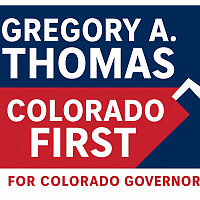“Colorado First”
Dr. Gregory A. Thomas Calls Out State Leadership Over Looming Food Assistance Crisis:
DENVER - Oct. 23, 2025 - PRLog -- Dr. Gregory A. Thomas, candidate for Governor of Colorado, is calling out the state's leadership after news that more than 600,000 Coloradans—over half of them children—are set to lose critical food assistance beginning November 1st due to the federal government shutdown.
According to Dr. Thomas, this crisis exposes the mismanagement and misplaced priorities of Governor Jared Polis and his administration.
"It's unacceptable that our state doesn't have the $120 million per month it takes to feed our families, yet somehow finds over $100 million every month to fund a failed corrections system," said Dr. Thomas. "The state of Colorado has chosen incarceration over compassion. That's not leadership—it's neglect."
Thomas, who made history as the first incarcerated person in U.S. history to run for governor, says this moment demands a reset in Colorado's priorities.
"Before we talk about locking people up, we need to talk about lifting people up. How can we justify feeding prisons while our children go hungry? Colorado must feed its families first—period."
Dr. Thomas is urging citizens to take immediate action by donating to FeedingColorado.org and supporting local food banks to help close the gap created by government inaction.
"When government fails, community must rise. Let's take care of our own while demanding better management, fiscal accountability, and compassion from those in power."
About Dr. Gregory A. Thomas
Dr. Gregory A. Thomas is a community reform advocate, educator, and candidate for Governor of Colorado running under the Colorado First campaign. His platform centers on Economic Empowerment, Education Reform, and Community Renewal—prioritizing real solutions that build strong families, safer neighborhoods, and a more just state for all Coloradans.
Colorado First: Policy, Purpose, and Plan for a Stronger Colorado
Colorado First lays out a bold, visionary blueprint for building a state economy and society rooted in ownership, opportunity, and dignity. These are the policies of Dr. Gregory A. Thomas, the first incarcerated candidate to run for governor in both Colorado and U.S. history, this guide combines actionable policy, rigorous fiscal planning, and transformative social initiatives to redefine what governance can and should accomplish.
At its core, Colorado First answers one question: how do we ensure that every Coloradan—not just the privileged few—can thrive? This guide presents a comprehensive, results-driven agenda across six pillars: economic independence, public safety and justice reform, education and workforce development, energy and environmental stewardship, community renewal, and fiscal responsibility.
Key Features of the Plan Include:
Economic Empowerment: Launching the Colorado Ownership Fund, expanding small business grants, cooperative ownership programs, and rural infrastructure investments to ensure local wealth creation and sustainability.
Transformative Justice: Centering victim survivors while restoring accountability and opportunity to those who have caused harm, reducing recidivism, and turning justice into a tool for community renewal.
Fiscal Leadership: A structured, five-year elimination of the state income tax balanced with new revenue streams, performance-based budgeting, and a publicly accessible dashboard for transparency.
Education & Workforce Development: A renewed focus on financial literacy, vocational training, apprenticeships, and second-chance education, equipping every student and reentry citizen with real-world skills.
Health, Housing, and Community Renewal: Expanding access to healthcare, mental wellness, affordable housing, and community development initiatives that stabilize neighborhoods and strengthen families.
Energy & Environment: A pragmatic, pro-Colorado approach that balances responsible fossil fuel production with renewable energy growth, conservation, and rural infrastructure investment.
This guide is more than a collection of policies—it is a roadmap for measurable, accountable, and transformative governance. Each section pairs visionary goals with concrete metrics, implementation strategies, and fiscal frameworks, ensuring Coloradans can track progress and hold leaders accountable.
Colorado First is a call to action: to empower communities, restore dignity, create opportunity, and ensure that prosperity is built, not borrowed. It is a guide for voters, legislators, and civic leaders who share a commitment to a stronger, fairer, and more resilient Colorado.
Ownership. Opportunity. Dignity. Every Coloradan counts.
Economic Empowerment for All
Building an Economy Rooted in Ownership, Opportunity, and Dignity — Not Trickle-Down Promises.
Colorado’s economy should work for every Coloradan — not just those at the top.
As Governor, Gregory A. Thomas will build a state economy that rewards work, fosters innovation, and creates pathways to ownership and independence in every community.
1. Expanding Small Business Grants & Cooperative Ownership
Empowering local entrepreneurs — especially in underserved and rural communities.
Plan of Action:
Launch the Colorado Ownership Fund (COF) — a $250 million revolving grant and low-interest loan program to help small businesses, minority-owned startups, and worker cooperatives gain access to capital.
Partner with credit unions and community development financial institutions (CDFIs) to increase microloan availability for first-time business owners.
Provide state-backed technical assistance programs — helping entrepreneurs with licensing, marketing, and digital tools.
Establish Colorado Cooperative Hubs that mentor communities on shared ownership and employee buyouts.
Expected Impact:
More small business starts, higher community retention of wealth, and increased economic resilience in historically overlooked areas.
2. Supporting Reentry Employment Programs
Unlocking potential. Restoring dignity. Rebuilding communities.
Plan of Action:
Create the “Second Chance Employment Initiative”, a statewide partnership connecting reentry citizens with trade unions, private employers, and mentorship programs.
Offer tax incentives to employers who hire formerly incarcerated Coloradans and provide ongoing training or certification.
Expand education and vocational training inside correctional facilities, ensuring job readiness before release.
Develop Reentry Resource Centers in every judicial district offering career guidance, ID assistance, and financial literacy.
Expected Impact:
Reduced recidivism, stronger families, and a labor force that reflects Colorado’s commitment to fairness and second chances.
3. Incentivizing Local Hiring & Job Creation
Jobs that build Colorado — not just profit from it.
Plan of Action:
Enact the “Colorado Works Here Act”, rewarding companies that hire local residents and reinvest profits in their communities.
Prioritize local contractors and suppliers in all state-funded infrastructure and green energy projects.
Establish a Statewide Job Creation Tax Credit for small and mid-sized businesses that hire within their county or region.
Expand broadband, road, and water infrastructure in rural areas to attract new industries and remote work hubs.
Expected Impact:
Balanced growth across the state, lower unemployment, and renewed vitality in both city centers and small towns.
4. Strengthening Trade, Technical & Apprenticeship Programs
Education should lead to opportunity — not debt.
Plan of Action:
Fund and expand the Colorado Skilled Workforce Network, linking high schools, community colleges, and trade unions.
Establish statewide paid apprenticeship programs in construction, clean energy, advanced manufacturing, and healthcare.
Integrate financial literacy, entrepreneurship, and civic education into the high school curriculum.
Offer debt forgiveness or tuition waivers for students completing public service or skilled trade programs in critical need sectors.
Expected Impact:
A workforce prepared for 21st-century industries — without the burden of lifelong student debt.
The Big Picture: How We’ll Get It Done
Funding Mechanisms:
Reallocate 5% of corporate tax credits from underperforming incentive programs into the Colorado Ownership Fund.
Secure federal matching grants through the American Rescue Plan and Workforce Innovation and Opportunity Act (WIOA).
Create public-private partnerships with local banks, credit unions, and trade organizations.
Implementation Strategy:
Appoint a State Director of Economic Inclusion to oversee equity-based development and accountability metrics.
Launch a Colorado Economic Empowerment Dashboard — publicly tracking jobs created, grants awarded, and business growth by county.
Host annual Governor’s Economic Empowerment Summit to showcase success stories, review progress, and adjust policy based on community feedback.
Vision: Ownership. Opportunity. Dignity.
When every Coloradan has the chance to earn a living, build a business, and pass something down, we don’t just grow an economy — we grow a legacy.
Gregory A. Thomas believes in a Colorado where prosperity is built, not borrowed.
Where opportunity belongs to everyone, and where work once again means dignity.
Education Reform That Builds Futures
Education must empower, not just inform. Gregory A. Thomas will reform Colorado’s education system to prepare young people for real-world success by:
Ensuring equitable funding for schools in every ZIP code.
Integrating financial literacy, entrepreneurship, and civic responsibility into public education.
Expanding vocational and STEM programs in both high schools and correctional institutions.
Increasing teacher pay and classroom resources to keep great educators in Colorado.
Goal: Every student — whether in Denver, Pueblo, or Sterling — deserves access to an education that creates options, not limitations.
Community Renewal & Public Safety
Real safety begins with strong communities — not just more prisons.
Gregory A. Thomas is committed to rebuilding trust between the people and public institutions through:
Investing in community-based violence prevention, mental health, and addiction recovery programs.
Redirecting resources from mass incarceration toward rehabilitation and opportunity.
Supporting law enforcement reform that emphasizes accountability, transparency, and human dignity.
Prioritizing housing stability and reentry programs to reduce homelessness and recidivism.
Goal: Safer neighborhoods through opportunity, fairness, and mutual respect.
Justice & Reentry Reform
Having lived through the system himself, Gregory A. Thomas brings a rare and necessary perspective to criminal justice reform. His platform includes:
Expanding second-chance laws and record-sealing opportunities for rehabilitated citizens.
Establishing state-funded reentry programs that focus on entrepreneurship, housing, and mentorship.
Reforming parole and probation to focus on growth and stability instead of punishment.
Bringing education, training, and voting rights restoration into correctional facilities.
Goal: Transform Colorado from a state of incarceration to a state of restoration.
Affordable Housing & Community Development
Every Coloradan deserves a place to call home. Gregory’s plan calls for:
Expanding affordable housing construction through public-private partnerships.
Protecting renters from predatory practices and stabilizing neighborhoods under pressure from gentrification.
Encouraging community land trusts to keep housing affordable for future generations.
Investing in green, energy-efficient building projects that create local jobs.
Goal: Make Colorado livable for the people who build it, serve it, and love it.
Health Equity & Mental Wellness
Health is more than hospitals — it’s access, awareness, and compassion.
Gregory A. Thomas will work to:
Expand Medicaid access and behavioral health coverage statewide.
Integrate trauma-informed care in schools, prisons, and community centers.
Address racial and economic health disparities through targeted state initiatives.
Support fitness, nutrition, and preventive care programs in underserved communities.
Goal: Healthy people, healthy communities, healthy Colorado.
Environmental Responsibility & Rural Renewal
Protecting Colorado’s natural beauty must go hand-in-hand with strengthening rural life. Gregory supports:
Renewable energy initiatives that create good-paying jobs.
Clean water and land conservation policies that respect both farmers and future generations.
Equitable rural infrastructure investments in broadband, transportation, and healthcare.
Goal: Keep Colorado green, clean, and thriving — from the plains to the peaks.
A Fiscal Transition Plan for a Tax-Free Colorado
(Gregory A. Thomas’ Five-Year Framework for Responsible Elimination of the State Income Tax)
Background
Colorado’s individual income tax currently generates roughly $13 billion per year, representing about one-third of total state revenues. Eliminating this tax without jeopardizing schools, transportation, or public safety requires a structured transition that replaces lost income tax receipts with diversified, sustainable revenue and targeted cost efficiencies. Economist and our next Governor, Dr. Gregory A. Thomas has the solution.
Guiding Principles
Fiscal Balance – Maintain a constitutionally balanced budget each fiscal year.
Equity Protection – Safeguard low- and moderate-income households through refundable credits and continued exemptions for necessities.
Transparency & Accountability – Publish annual fiscal scorecards verified by independent auditors.
Growth-Based Recovery – Use tax reform to attract business investment, increase employment, and broaden the consumption base.
Five-Year Transition Framework
Year 1: Assessment & Downshift
Reduce the income-tax rate by 25 %.
Broaden the state sales-tax base to include selected services.
Begin comprehensive performance audits of all major agencies.
Year 2: Revenue Diversification
Introduce modest adjustments to the state sales-tax rate coupled with refundable low-income credits.
Increase severance and tourism-related taxes; dedicate a share to a new Revenue Stabilization Fund.
Implement efficiency reforms expected to save 3–5 % of General Fund expenditures.
Year 3: Structural Realignment
Continue phased income-tax reductions; modernize corporate tax rules and fee structures.
Launch a capital-investment initiative for workforce development and small-business growth.
Year 4: Full Phase-Out
Complete elimination of the individual income tax.
Activate automatic fiscal safeguards to protect core services if revenues soften.
Year 5: Stabilization & Evaluation
Independent audit certifies balanced budget status.
Convert a portion of resource and tourism surpluses into a permanent Colorado Prosperity Fund for future volatility.
Expected Outcomes
Broader and more resilient revenue base tied to consumption and tourism rather than wages.
Competitive tax environment to attract high-growth industries.
Protects essential services and low-income families through targeted credits.
Positions Colorado for long-term fiscal independence and economic expansion.
Dr. Gregory A. Thomas unveils his “Colorado First” Transformative Justice Policy
Vision Statement
“Restoration is not softness — it’s structured accountability with concrete repair.”
Crimes don’t just violate statutes; they wound people, families, and communities. While no policy can erase harm, Colorado will build a justice system that demands accountability, centers victim survivors and their loved ones, and transforms those who cause harm into contributors rather than repeat liabilities.
This is not leniency — it’s leadership.
This is not weakness — it’s wisdom.
Because true justice is not the absence of punishment, but the presence of transformation.
Colorado First means Justice First — for victim survivors, for communities, and for Colorado’s future.
The Problem
Colorado’s current system too often produces punishment without progress.
1. Victim Survivors are left voiceless, navigating trauma without closure.
2. Authors of harm serve time but rarely emerge habilitated or employable.
3. Communities carry the weight of both the original harm and the recurring cycle of crime.
More than 45% of Colorado’s incarcerated population will return within three years. The cost of re-incarceration, lost productivity, and untreated trauma exceeds $1 billion annually.
That is not justice — that is waste. Colorado deserves a system that turns consequences into correction and second chances into social dividends.
The Colorado First Transformative Justice Framework
1. Center Victim Survivors and Families
Justice begins where the harm occurred — with victim survivors.
Establish Victim Survivor Restoration Councils in every judicial district to give victim survivors a voice in resolution, restitution, and reentry plans.
Create Victim Survivor Recovery Accounts funded through authors of harm earnings and state partnerships to support counseling, financial assistance, and recovery services.
Encourage victim survivor impact inclusion in all sentencing and parole proceedings.
2. Structured Accountability for Authors of harm
Accountability is not optional — it is the foundation of redemption.
Implement Transformative Justice Panels where authors of harm must face those impacted and present concrete plans for restitution, employment, and education.
Require participation in skills-based habilitation, including trade certification, entrepreneurship programs, and civic education.
Create an inmate work credit system that ties early release eligibility to demonstrated community restitution and victim survivor repair milestones.
3. Community-Based Repair and Reintegration
Public safety depends on transformation, not warehousing.
Launch Community Partnership Zones — local collaborations between correctional institutions, employers, nonprofits, and faith-based groups.
Provide tax incentives for businesses that hire returning citizens who complete transformative justice requirements.
Expand transitional housing and reentry mentoring programs to reduce homelessness, relapse, and recidivism.
4. Smart Investment in Safety and Savings
Every dollar spent on reform must produce measurable returns in safety, labor, and civic restoration.
Reinvest 50% of savings from reduced reincarceration rates into victim survivor services, local law enforcement training, and community safety programs.
Establish a Colorado Transformative Justice Innovation Fund to pilot technology-driven accountability tools — from digital restitution tracking to reentry dashboards.
The Colorado First Promise
Colorado will no longer settle for a system that breaks people twice — first through crime, then through permanent exile.
We will build a justice system where:
Victim survivors find a voice, not vengeance.
Authors of harm face accountability, not endless condemnation.
Communities gain contributors, not chronic costs.
Outcome Goals
By 2030, the Colorado First Transformative Justice Plan will:
Reduce recidivism by 30% statewide.
Increase victim survivor satisfaction with justice outcomes by 50%.
Redirect $250 million annually from incarceration costs into prevention, restitution, and reinvestment.
Colorado First. Justice That Restores. Leadership That Redeems.
“Restorative justice repairs the harm. Transformative justice prevents the next one.”
Dr. Gregory A. Thomas: “Colorado First Means Safety First”
Opposes National Guard Deployments by Federal Authorities; Will Protect Colorado Citizens and Preserve Humanitarian Immigration Policy
Dr. Gregory A. Thomas, Republican candidate for Governor of Colorado, today announced his firm opposition to any federal decision to deploy the U.S. National Guard or other federal forces into Colorado cities without the express consent and coordination of the state government. As governor, Thomas says he will take the protection of Colorado citizens personally — defending communities from violent gangs while insisting that immigration be handled with humanity and common sense.
“Colorado is my family,” Thomas said. “As governor I will protect that family. I will not be a passive observer while outside groups — foreign or domestic — try to prey on our neighborhoods. At the same time, we will treat immigrants as human beings, not strawmen. Not every person who crosses our border is a criminal. We will face immigration head on with compassion and clear-eyed enforcement where needed.”
Key elements of Dr. Thomas’s approach to public safety and immigration:
State Sovereignty and Local Control:Thomas opposes unilateral federal deployments in Colorado communities and will insist on state consent, intergovernmental coordination, and clear legal authority before any federal force operates on Colorado soil. He will use every lawful channel to protect Colorado’s authority and the safety of residents.
Equip and Empower Local Law Enforcement: The Colorado First plan will prioritize funding, training, intelligence-sharing, and equipment for municipal and statewide law enforcement so that they have the capacity to prevent and dismantle violent gangs and criminal networks. Thomas will pursue targeted grants, specialized task forces, and cross-jurisdictional cooperation to keep communities safe.
Humane, Practical Immigration Policy: Immigration will be addressed from a humanistic perspective — protecting families, upholding the rule of law, and distinguishing between asylum-seekers and those who pose a criminal threat. Thomas supports expanded screening, expedited prosecution of violent offenders, and referrals to social services and legal pathways for those seeking refuge and work.
Community-Based Prevention and Restoration: Public safety under Colorado First extends beyond enforcement. Thomas will expand prevention efforts — youth outreach, mentorship, job and apprenticeship programs, and community violence interruption initiatives — to reduce recruitment into gangs and create alternatives for at-risk residents.
Legal Pushback Against Federal Overreach: If federal action threatens Colorado’s civil authorities or the safety of its communities without proper coordination, the Thomas administration will assert the state’s rights through lawful avenues, including litigation and negotiated agreements that safeguard residents and maintain order.
“Safety is not only about force,” Thomas said. “It’s about urgency, intelligence, prevention, and investing in our people. It’s also about standing up for Colorado’s independence as a state and insisting the federal government consult and cooperate rather than impose. I will be relentless in protecting our citizens, while also protecting the dignity of families who come here seeking a better life.”
Statement on Colorado's Rising Crime Rates Despite Lower Recidivism Numbers
The recent news report highlighting a decline in recidivism while overall crime rates in Colorado continue to rise exposes a deep flaw in our state's approach to justice and habilitation. It's clear that the current system is failing the people of Colorado.
As a candidate for Governor, I refuse to ignore this contradiction. We cannot keep releasing individuals from prison without the tools, treatment, and transformation necessary to re-enter society as law-abiding, purpose-driven citizens. Punishment without purpose has never worked — and never will.
My administration will tackle this issue head-on. Under a Colorado First leadership, we will implement comprehensive, evidence-based reentry programs that prioritize mental health treatment, trauma healing, vocational training, and personal transformation before release — not after. The goal is simple: ensure that those who have authored harm are equipped to write new chapters in their lives, contributing positively to our communities instead of cycling back into the system.
Our state must stop mistaking punitive measures for public safety. Real safety is born out of transformation, accountability, and opportunity. Colorado deserves a system that heals rather than merely punishes — and my administration will deliver exactly that.
Colorado First means putting humanity, community, and common sense back into our justice system.
—
Dr. Gregory A. Thomas
Candidate for Governor of Colorado
Colorado First Campaign
https://www.gregforgovernor.org
Statement from Dr. Gregory A. Thomas on Phil Weiser’s “Opportunity Agenda”
Colorado doesn’t need another polished plan — we need proof that plans actually work.
While Attorney General Phil Weiser’s “Opportunity Agenda” sounds good on paper, Colorado families are living the reality that slogans can’t fix. Our housing is unaffordable, our rural communities are drying up, our schools are overburdened, and the mental health crisis has outpaced every statewide promise. Colorado deserves results, not recycled talking points dressed as innovation.
The difference between our campaigns is simple:
Phil Weiser is talking about opportunity.
Colorado First is building it.
1. Workforce and Jobs
Weiser says he’ll “invest in job training.” Colorado First is already building a statewide network to connect every Coloradan — including returning citizens, veterans, and single parents — directly with employers through our Colorado Works Initiative.
Our plan eliminates red tape, cuts bureaucratic overlap, and empowers local business leaders to lead training tailored to their communities.
We’re not creating another government “ColoradoCorps” bureaucracy — we’re unleashing Colorado’s people to build Colorado’s economy.
2. Rural Investment
Weiser talks about rural broadband and farm-to-market programs. We agree those matter — but talk doesn’t lay fiber, and grants don’t build roads that last.
Our Colorado First Infrastructure Fund will prioritize rural counties first, ensuring that a farmer in Yuma or a rancher in Monte Vista has the same access to opportunity as a family in Denver.
We’ll put infrastructure decisions in the hands of local leaders — not Denver committees — because nobody knows rural Colorado better than the people who live there.
3. Small Business Growth
Weiser wants to “boost small business growth.” Colorado First is doing something bolder — we’re eliminating the state income tax to attract entrepreneurs, keep capital in Colorado, and give small business owners breathing room to grow and hire.
Instead of taxing ambition, we’re rewarding it. That’s how you build a sustainable, self-sufficient economy — not one dependent on endless state programs.
4. Education and Youth Development
Every candidate promises better schools. But where’s the accountability for how those billions are spent?
Colorado First will redirect funds to classrooms, not administrative overhead. We’ll pay teachers more, not pay more consultants.
Our Colorado Mentorship Pipeline will connect high school students directly with real-world mentors — business owners, tradespeople, scientists, and veterans — so that every child graduates with both a diploma and a direction.
5. Mental Health
Weiser calls for more “behavioral health workforce expansion.” Colorado First calls for community-based intervention.
We’ll open mobile mental health units in all 64 counties, staffed by trained professionals who can reach people where they are — at schools, shelters, and workplaces — not months later through a waiting list.
We don’t need another roundtable. We need action. And we’re delivering it.
6. Building Colorado’s Future
The “ColoradoCorps” may sound noble, but it’s just another government-run program with a new name.
Colorado First believes in service, but we believe it should be community-driven, not state-controlled.
Our Colorado First Service Network will partner with churches, nonprofits, and civic groups that already know their neighborhoods — no new bureaucracy, just collaboration that works.
7. True Inclusion Means Everyone
Weiser talks about inclusion — we’re living it. Colorado First brings together Republicans, Democrats, and Independents, rural and urban, business and labor — united under one simple truth: if Colorado fails its people, then politics has failed its purpose.
The Bottom Line
Phil Weiser is a career bureaucrat who believes solutions come from new programs.
Dr. Gregory A. Thomas is a builder of systems that empower people.
Colorado First isn’t government “doing more” — it’s government doing better.
We don’t just want Coloradans to survive — we want them to own their future.
Next November, let’s build a Colorado that feeds its families before it funds its politics, a Colorado that creates jobs before it creates programs, and a Colorado that stands tall — united, self-reliant, and truly Colorado First.















